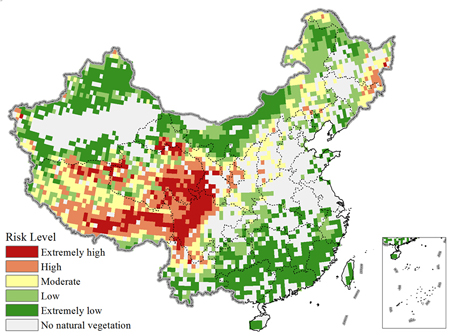
A new study projected fundamental ecosystem transitions for predicting ecosystem shifts in the Tibetan Plateau and agro-pastoral ecotone of China at the end of this century. Researchers from the Institute of Geographic Sciences and Natural Resources Research (IGSNRR) of the Chinese Academy of Sciences and Indiana University-Purdue University Indianapolis, assessed the potential risk of ecosystem shifts in response to future climate change and identified the area with high risk in China.
Using four global gridded vegetation models (GGVMs) and an aggregate metric, they analysed and estimated climate changes in macroscopic ecosystem features including carbon fluxes, carbon stocks and water fluxes.
The study suggested that the ecosystem in the Tibetan Plateau and an area extended northeastward from the Tibetan Plateau to northeast China (agro-pastoral ecotone of China) are most vulnerable under climate change.
“This is the first assessment of biome shift projections at the level of eco-regions in China. Although global assessment has provided a portrait, the regional analysis are generally not available for policy makers who are more interested in the risk and contributing factors of the risk at the scale of administrative area or eco-regions.” said the lead author of the study, YIN Yuanyuan, a postdoctoral researcher in Professor TANG Qiuhong’s research group at IGSNRR.
“Our study identified the hotspots highly vulnerable to climate change and revealed the main contributing factors to ecosystem shifts. The results could be used to support decisions on promoting ecological progresses and developing climate change adaptation strategies at the regional scale.”
The results of the study are published in the journal Scientific Reports (Yuanyuan Yin, Qiuhong Tang, Lixin Wang & Xingcai Liu, Risk and contributing factors of ecosystem shifts over naturally vegetated land under climate change in China, Scientific Reports 6:20905 DOI: 10.1038/srep20905).
The study was funded by the National Basic Research Program of China, National Natural Science Foundation of China and the National Youth Top-notch Talent Support Program in China.
Ecosystem shifts risk over naturally vegetated land at the end of this century under the RCP 8.5 scenarios (Image by YIN Yuanyuan)


86-10-68597521 (day)
86-10-68597289 (night)

86-10-68511095 (day)
86-10-68512458 (night)

cas_en@cas.cn

52 Sanlihe Rd., Xicheng District,
Beijing, China (100864)

